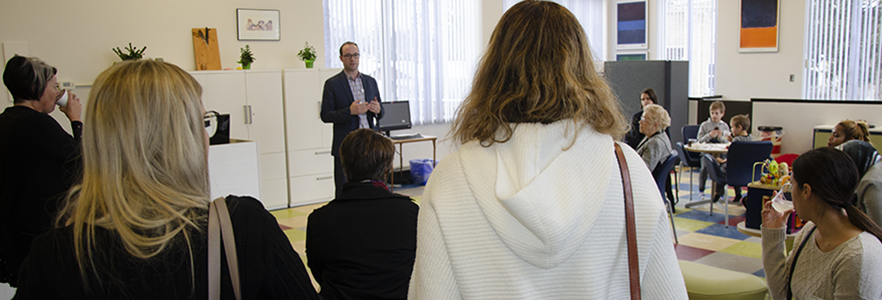
Director of the Child and Youth Development Clinic, professor Colin King, addresses faculty, student clinicians and supporters during the clinic’s second anniversary celebration.

Director of the Child and Youth Development Clinic, professor Colin King, addresses faculty, student clinicians and supporters during the clinic’s second anniversary celebration.
One referral every 1.5 days. That’s how busy the Child and Youth Development Clinic has been in two years of operation.
Since the clinic opened 800 days ago, it has received 693 referrals and has provided support to 500 families.
“It’s quite overwhelming to think of where we started and where we are today,” said Director of the Child and Youth Development Clinic, professor Colin King. “The journey has so far exceeded my expectations.”
Recently, the clinic brought together its supporters to celebrate its second anniversary. King told the gathering that five out of six children who need mental health services won’t get the help they need.
This is where the clinic is stepping in and filling the void to help reduce waitlists and wait times for service.
“The type and amount of care you receive shouldn’t depend on how much money is in your bank account,” said King.
The clinic, which opened in October 2017, provides consultation, assessment, and intervention services from graduate student clinicians in psychology and social work to children and youth from three to 18 years of age. Graduate students in School and Applied Child Psychology, Clinical Psychology, Counselling Psychology and Social Work programs at Western can participate at the clinic.
Over the last two years, 54 students have worked with families.
PhD student and psychology intern, Richelle Bird is one of the students who has been honing her skills at the clinic. She believes working at the clinic has helped her grow as a student, clinician and as a future psychologist.
“The clinic’s mandate is to meet families and children where they’re at,” said Bird. “That forces us – as students – to get creative and innovative to really focus on removing barriers to accessing mental health services.”
Bird credits King for allowing students to play an active role in helping determine the types of services the clinic offers to meet the needs of children and families.
What’s more, community engagement is also important for the clinic. So far, the Thames District Valley School Board, London District Catholic School Board, Conseil Scolaire Viamonde, Learning Disabilities Association of London Region, Vanier Children’s Services and the Muslim Resource Centre are collaborating or working in partnership with the clinic.
Over the next year, King hopes to increase community partnerships and services, allowing the clinic to reach more families.